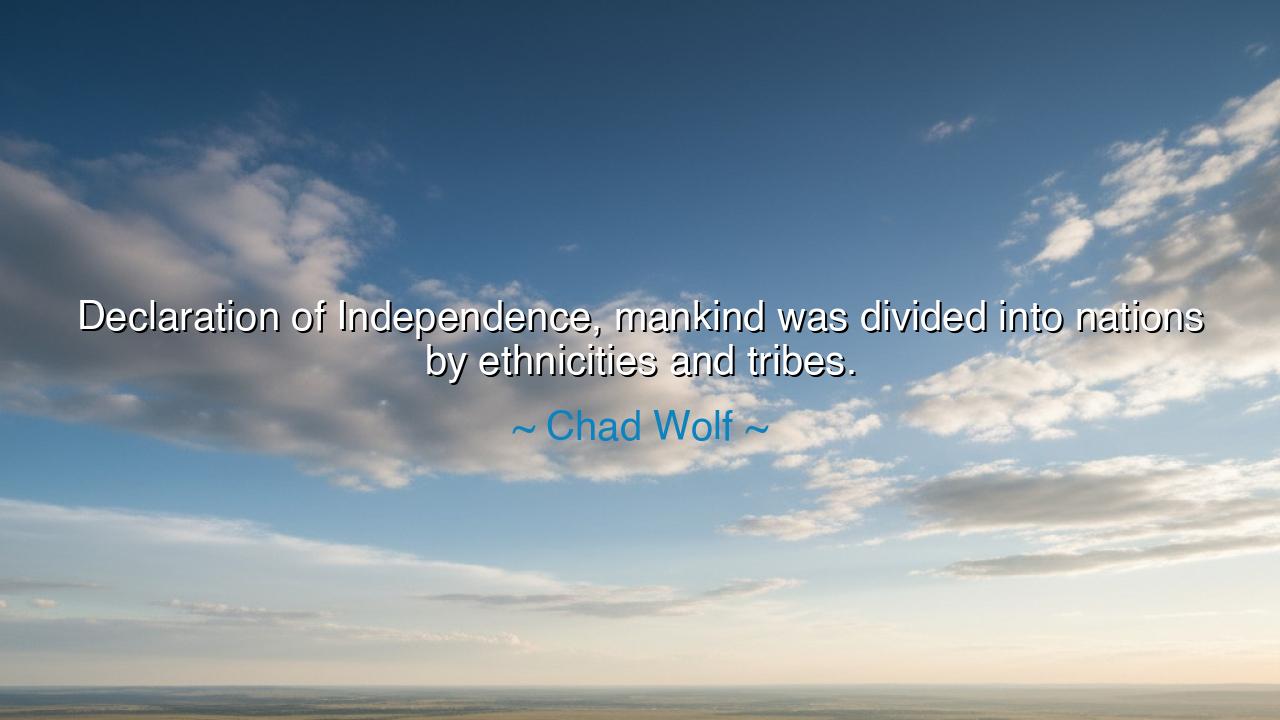
Declaration of Independence, mankind was divided into nations by
Declaration of Independence, mankind was divided into nations by ethnicities and tribes.






The words of Chad Wolf call us to remember a turning point in the long and weary journey of humankind. When he said, “Before the Declaration of Independence, mankind was divided into nations by ethnicities and tribes,” he spoke not only of a political document, but of a revolution of the human spirit. His reflection reminds us that the Declaration was not merely the birth of a new country—it was the birth of a new idea: that identity need not be bound by blood, nor belonging by ancestry. It was the moment when the world first glimpsed the possibility that a people might unite not because they were of the same tribe, but because they were of the same conviction.
Before that time, the earth was carved into kingdoms of blood and soil. A man belonged where he was born, and his destiny was written in the lineage of his fathers. Tribes, clans, and empires defined the measure of his worth. The world knew loyalty to family and ruler, not to principle. A peasant could not become noble, nor a foreigner a citizen. Humanity, though vast and varied, was trapped in the narrow walls of descent and dominion. But with the Declaration of Independence, the founders of America proclaimed a daring truth: that all men are created equal, and that their rights are endowed not by rulers or bloodlines, but by the Creator Himself. In those words, the ancient order trembled.
Chad Wolf’s insight pierces to the core of this transformation. He reminds us that the American experiment was not only a rebellion against a king, but against the very idea that nations must be bound by ethnicity. The United States, though imperfect in its beginning, was conceived as a nation built not upon tribe, but upon principle—a nation of ideals rather than of inheritance. It offered the world a vision where belonging was not determined by race or lineage, but by shared belief in liberty and justice. This was an idea as radical as fire in a frozen world.
Consider the story of Frederick Douglass, born into slavery and denied every right that the Declaration proclaimed. Yet Douglass, in time, became one of its greatest defenders—not because it was flawless, but because he saw within it the promise of what mankind could become. He declared that the principles of the Declaration of Independence were a “saving faith,” meant to apply not to one tribe or color, but to all people who dared to claim their freedom. Through his words and his life, Douglass proved that the document’s vision could transcend the chains of ethnicity and the scars of history.
In the voice of the ancients, we may say: The Declaration was a covenant, not of blood, but of belief. It was the first time a nation was born not from the soil of inheritance, but from the seed of an idea. It gathered people from every shore and told them, “You are one people—not because you share a lineage, but because you share a creed.” And though the promise has been tested and broken, again and again, its essence endures like a sacred fire that will not go out. For whenever the world returns to tribalism, whenever nations retreat into hatred and division, the light of those words reminds us that humanity can rise beyond its own past.
Yet Wolf’s warning also echoes through his praise. For even in the modern age, we see the old tribal lines redrawn—nations dividing, people defining themselves again by what separates them rather than what binds them. The spirit of the Declaration fades when the heart of a people forgets that liberty was meant to unite, not divide. To build a nation upon ideals requires constant vigilance, for ideals are fragile when men grow weary of defending them. The temptation to return to the comfort of tribe—to seek safety in sameness—lurks in every generation.
Thus, the lesson is clear: never forget that the highest form of unity is born not from shared blood, but from shared purpose. The Declaration of Independence was not the end of tribalism, but the beginning of the struggle against it. It teaches us that to be free is to choose principle over prejudice, justice over lineage, and courage over comfort.
The practical path is this: live as citizens of principle, not of tribe. See your neighbors not as rivals of heritage, but as partners in destiny. Guard against the voices that would divide by race or origin, and instead strengthen the bonds that arise from shared belief in freedom. For the world before the Declaration was bound by tribes; the world after it has the chance to be bound by truth. And if we remember that, the flame of independence—of the soul as well as the state—will never be extinguished.






AAdministratorAdministrator
Welcome, honored guests. Please leave a comment, we will respond soon